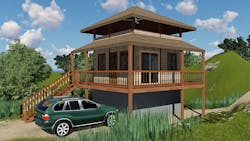The second in a series following a tiny house construction project in Ecuador.
Just as with any construction project, our tiny house by the ocean in Ayangue, a fishing village in Ecuador, will require a material list and the purchase of lumber.
In our case, we bought the lumber nearly two years ago, as material comes green, and must set in the sun for many months, rather than in a kiln for a few hours.
Materials for the guard house arrive at the job site, Gadua cane (Guadua angustifolia) posts, and bamboo screening. Before any materials arrive for construction, we will need 24-hour vigilance on site.
The thick cane, which grows up to 30 meters in length, grows wild next to regional rivers but originally came from Asia.
The native cane is much thinner, and used only for none structural components, such as demising walls.
The house measures a slim 5 meters by 5 meters (roughly 225 sf), and we’re building directly over a large concrete cistern that will eventually provide water for about 30 homes.
The construction site is a peninsula jutting into the Pacific, where we have started an ecological subdivision. The views are spectacular, and the climate will permit mango trees, palms, tamarind, and other tropical wonders.
Our little house, all in, should cost about $25,000 to build. It’s where my wife and I will live while we develop the rest of the property. Eventually, it will provide a small overflow rental for residents who need a little bit more room for extra friends or relatives on any given weekend. Kind of like an occasional granny cottage.
About the Author
Fernando Pagés Ruiz
Fernando Pagés Ruiz is ProTradeCraft's Latin America Editor. He is currently building a business in Ecuador and a house in Mexico. Formerly, he was a builder in the Great Plains and Mountain States. He is author of Building an Affordable House and Affordable Remodel (Taunton Press).
